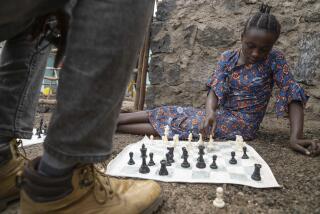‘You have to have no ego as a chess hustler--you have to fake losing and take it’
- Share via
In a city filled with outdoor sports enthusiasts, 28-year-old Cyrus Lakdewala prefers his games indoors. Born in Bombay and raised in Montreal, San Diego’s only professional chess player spends his days sequestered in his library, studying the intricacies of the game and pondering the oddness of living life as a self-proclaimed “chess addict.” Times staff writer Leslie Wolf interviewed Lakdewala, and Kenneth K. Lam photographed him.
I started playing chess when I was about 8. After one week of playing, I said, “This is it!” I was totally hooked. It’s sort of a mixture between art and science and sport. I know one thing, though, it’s not a game--it goes way beyond that.
As a kid, I never worked at McDonald’s--I hung out at a chess cafe and hustled people for change. The bigger the city, the more it tends to become a gambling thing. Like in New York, everybody plays for money there. Some are incredibly good at it. If you’re so much better than your opponent, you can make every game look close, and sometimes you have to throw a game.
I know one chess hustler in San Diego who’s from New York. He hustles chess for 50 cents a game at the Balboa Club. He’s loud and obnoxious and insults his customers, he makes them so irate that all they can think of is revenge, and they come back over and over.
You have to have no ego as a chess hustler--you have to be able to fake losing games and take it. On the other hand, your opponent is basically a puppet, and you’re manipulating him, so there’s a secret glee to it. Fortunately, I quit that a long time ago.
Now, I make a living by playing, writing a chess column and teaching. Practicing and study takes up most of my time. You have to keep up with the latest variations. It’s constantly changing.
I’ve tried desk jobs before, but I go nuts very quickly. When you get a job, your boss tells you what to do, and you have to do it, and that’s an outrage! I have to work alone, which is very difficult because chess is not really a marketable skill. That’s a very common syndrome among chess players--an inability to fit in unless they’re in a chess environment. I’ve been very lucky, opportunities have really come to me. Most pro chess players just play in Europe, where they can get corporate sponsorship and be supported better.
One of the reasons chess is not as big here is that it’s not a fast-paced game and this is a fast-paced country. It’s atrocious as a spectator event. I guess the mentality of the American expects instant gratification, and chess isn’t like that. It teaches patience.
A tournament game usually lasts two hours. It gives you plenty of time to look for fantastic moves, and makes for a very cerebral game. But lately, 30-minute chess has caught on. It leads to these horrendous scrambles at the end of the game and pieces are flying all over the place and suddenly it becomes a spectator sport. The purists are really against it--they say it leads to bad chess. But I think blunders and bad moves make it into a sport. The faster version is more fun, and a lot more psychology is required.
When you play in tournaments you earn a rating. The higher you are, the more points you can lose each time you play, and you lose on draws, too. I’m the only Senior Master player in San Diego. I’m about 50th in the country now, so I need to improve a jump in order to be invited to the top tournaments. The standard way to do it is to go to Europe and travel around, going from tournament to tournament.
I originally planned on living the nomadic life of a chess player, but my marriage in 1983 changed my life a lot--I sort of stabilized. I tend not to leave the state much for tournaments now because I need my books and my library for research.
The problem with succeeding in the game is it’s too difficult. You have to work at it for a period of time before you understand the beauty of it. But that’s basically a level most people can never reach because it takes too much work. I’m not terribly talented, I’m just a hard worker. You work to get better, and the progress is agonizingly slow.
Chess is a very inward game. It teaches you a lot about yourself because a lot of weaknesses in chess tend to be your personal weaknesses. If you happen to be a hyper-aggressive player or very passive, that’s going to be the way you are. My playing style is very contorted and very disorganized. I’m a counter-attacker. I can’t bring myself to attack someone first. Also, I like cramped positions. It would take a psychologist to figure this out.
The typical fanatical chess player really isn’t a nerd at all. They’re closer to artists or poets, really. It’s like poetry translated into mathematics, that’s how I see chess.
More to Read
Go beyond the scoreboard
Get the latest on L.A.'s teams in the daily Sports Report newsletter.
You may occasionally receive promotional content from the Los Angeles Times.










